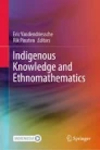- About MAA
- Membership
- MAA Publications
- Periodicals
- Blogs
- MAA Book Series
- MAA Press (an imprint of the AMS)
- MAA Notes
- MAA Reviews
- Mathematical Communication
- Information for Libraries
- Author Resources
- Advertise with MAA
- Meetings
- Competitions
- Programs
- Communities
- MAA Sections
- SIGMAA
- MAA Connect
- Students
- MAA Awards
- Awards Booklets
- Writing Awards
- Teaching Awards
- Service Awards
- Research Awards
- Lecture Awards
- Putnam Competition Individual and Team Winners
- D. E. Shaw Group AMC 8 Awards & Certificates
- Maryam Mirzakhani AMC 10 A Awards & Certificates
- Two Sigma AMC 10 B Awards & Certificates
- Jane Street AMC 12 A Awards & Certificates
- Akamai AMC 12 B Awards & Certificates
- High School Teachers
- News
You are here
Indigenous Knowledge and Ethnomathematics

Publisher:
Springer
Publication Date:
2023
Number of Pages:
299
Format:
Hardcover
Price:
239.99
ISBN:
978-3030974817
Category:
Collection
[Reviewed by , on ]
Deborah Gochenaur
10/8/2023
This volume strives to strengthen readers’ understanding of the connections between Indigenous knowledge and ethnomathematics and how those connections have changed over the past 50 years. Most included chapters were presentations at the 18th International Union of Anthropological and Ethnological Sciences World Congress held in Brazil in 2018, with many of the chapters re-worked to be included in this volume. Chapters are divided into three main sections: introduction to the connections between ethnography and mathematics; the impact of Indigenous culture on education in a broad sense and classrooms in particular; and finally, meta-studies highlighting specific empirical research.
Each of the chapters in Part 1 begins by explaining the activity or game including the cultural importance of how it developed. The authors then begin to connect those activities to mathematical algorithms, searching for patterns and relations. Through modeling, both visual and symbolic, readers are encouraged to explore and analyze game play and procedures, searching for the richness of geometric and algorithmic properties that these cultures bring to mathematics.
Part Two includes a summary of Brazil’s near destruction of Indigenous populations and finally the law granting civil and political rights to Indigenous peoples in the 1970’s. Sadly, this devastating history of the colonization of Indigenous populations rings familiar as it has occurred regularly around the world. Note, the narrative is dense with details and it is recommended that readers take their time through these sections. The last chapter in this part covers mathematics education in Greece and the study of two differing approaches as it is related to ethnomathematics.
Part Three contains an overview of three meta-studies with differing foci, describing their own books that contain in-depth information on their studies. Each chapter begins with an introduction to describe the country, culture, and a summary of highlights to be examined more fully within each chapter. It was interesting to read that there exist many differing counting still in use today in Papua New Guinea, each created by the need to count things, typically in trading.
The editors close the volume with a variety of potential avenues for research and encourage readers to pursue work in this field.
Bottom Line: Over the last fifty years, the study of ethnomathematics and the inclusion of culturally relevant frameworks for mathematics has moved from a purely euro-centric view by mathematicians and poorly framed mathematics view by anthropologists to a sharing of vision between the two, each working to bring balance to the research. This book brings this work together and gives us a balanced look at the connections between Indigenous peoples and mathematics.
This volume would be of interest to mathematics educators looking to bring relevance to their in-class activities, mathematical historians hoping to deepen their understanding of these topics, and finally, to mathematicians who are themselves wrestling with how colonization has impacted not only the peoples themselves but also the mathematics they bring with them.
Dr. Deborah Gochenaur is an Associate Professor at Shippensburg University in Pennsylvania with a B.S. in Mathematics from Penn State Harrisburg and a M.S. in Mathematics from Shippensburg University, and a Ph.D. in Mathematics Education for American University. She is an active member of mathematics and mathematics education organizations, serving on state and national committees.
See the publisher's website.
- Log in to post comments




